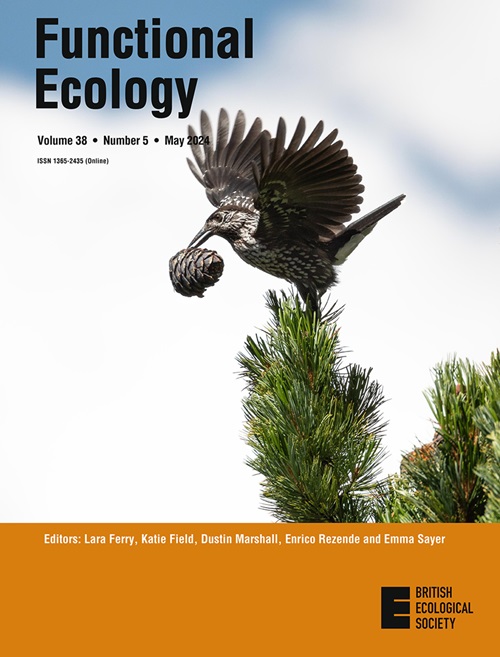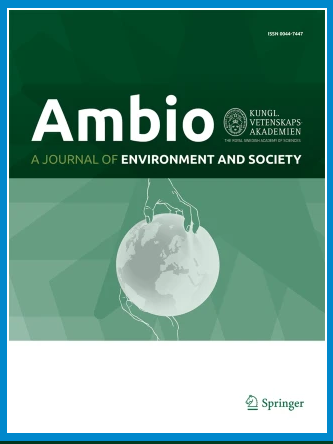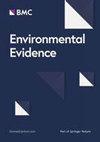中文名称:
功能生态
期刊缩写:
Funct. Ecol.
影响因子:
5.1
ISSN:
print: 0269-8463
on-line: 1365-2435
on-line: 1365-2435
研究领域:
环境科学-生态学
创刊年份:
1987年
h-index:
137
自引率:
1.90%
Gold OA文章占比:
36.84%
原创研究文献占比:
93.33%
SCI收录类型:
Science Citation Index Expanded (SCIE) || Scopus (CiteScore)
期刊介绍英文:
Functional Ecology publishes high-impact papers that enable a mechanistic understanding of ecological pattern and process from the organismic to the ecosystem scale. Because of the multifaceted nature of this challenge, papers can be based on a wide range of approaches. Thus, manuscripts may vary from physiological, genetics, life-history, and behavioural perspectives for organismal studies to community and biogeochemical studies when the goal is to understand ecosystem and larger scale ecological phenomena. We believe that the diverse nature of our journal is a strength, not a weakness, and we are open-minded about the variety of data, research approaches and types of studies that we publish. Certain key areas will continue to be emphasized: studies that integrate genomics with ecology, studies that examine how key aspects of physiology (e.g., stress) impact the ecology of animals and plants, or vice versa, and how evolution shapes interactions among function and ecological traits. Ecology has increasingly moved towards the realization that organismal traits and activities are vital for understanding community dynamics and ecosystem processes, particularly in response to the rapid global changes occurring in earth’s environment, and Functional Ecology aims to publish such integrative papers.
期刊介绍中文:
Functional Ecology 是一本致力于推动对生态模式和过程机理认识从有机体到生态系统各个尺度的学术期刊。它采用多学科的方法,涵盖了从生理学、遗传学、生命史和行为学角度研究生物体,以及从群落和生物地球化学角度研究生态系统和更广阔生态现象的论文。期刊认为其内容的多样性是一种优势,对各种数据、研究方法和研究类型持开放态度。《功能生态学》特别强调几个关键研究领域,包括将基因组学与生态学结合的研究、探讨生理学关键方面(如压力)如何影响动植物生态学或其逆效应的研究,以及研究进化和人为(全球)变化如何影响功能和生态特征之间相互作用的论文。期刊认识到,生物体的性状和活动对于理解群落动力学和生态系统过程至关重要,尤其是在快速全球变化的地球环境中。
CiteScore:
| CiteScore | SJR | SNIP | CiteScore排名 |
|---|---|---|---|
| 9.0 | 1.877 | 1.459 | 学科 排名 百分位 大类:Agricultural and Biological Sciences 小类:Ecology, Evolution, Behavior and Systematics 48 / 721 93% |
发文信息
中科院SCI期刊分区
2025年3月20日发布
| 大类 | 小类 | TOP期刊 | 综述期刊 |
|---|---|---|---|
| 1区 环境科学与生态学 | 2区 生态学 ECOLOGY | 是 | 否 |
2023年12月发布
| 大类 | 小类 | TOP期刊 | 综述期刊 |
|---|---|---|---|
| 1区 环境科学与生态学 |
2区
生态学
ECOLOGY
|
是 | 否 |
WOS期刊分区
| 学科分类 |
|---|
Q1ECOLOGY |
历年影响因子
| 2015年 | 5.2100 |
|---|---|
| 2016年 | 5.6300 |
| 2017年 | 5.4910 |
| 2018年 | 5.0370 |
| 2019年 | 4.4340 |
| 2020年 | 5.6080 |
| 2021年 | 6.2820 |
| 2022年 | 5.2000 |
| 2023年 | 4.6000 |
| 2024年 | 5.1000 |
历年发表
| 2012年 | 150 |
|---|---|
| 2013年 | 183 |
| 2014年 | 174 |
| 2015年 | 236 |
| 2016年 | 211 |
| 2017年 | 233 |
| 2018年 | 238 |
| 2019年 | 257 |
| 2020年 | 252 |
| 2021年 | 265 |
| 2022年 | 243 |
投稿信息
出版周期:
Bimonthly
出版语言:
English
出版国家(地区):
ENGLAND
审稿时长:
4 months
出版商:
Wiley-Blackwell Publishing Ltd
编辑部地址:
WILEY-BLACKWELL PUBLISHING, INC, COMMERCE PLACE, 350 MAIN ST, MALDEN, USA, MA, 02148
Functional Ecology - 最新文献
Visual ecology in challenging environments: How organisms evolve in extremes of light and adapt to shifting conditions
Pub Date : 2025-09-30 DOI: 10.1111/1365-2435.70162 Zuzana Musilova, Sara Mae StiebIn good form: Morphological adaptations to burrowing lifestyles in cockroaches (Dictyoptera: Blattodea)
Pub Date : 2025-09-12 DOI: 10.1111/1365-2435.70140 Barbara Bignon, Juliette Berger, Arnaud Delapré, Philippe Grandcolas, Tony Robillard, Erich Bornberg-Bauer, Raphaël Cornette, Frédéric LegendreSex-specific non-structural carbohydrate variation and hydraulics explain differences in drought resistance of Populus euphratica females and males along an aridity gradient
Pub Date : 2025-09-11 DOI: 10.1111/1365-2435.70160 Lei Yu, Haixiang Dai, Lidong Fang, Helena Korpelainen, Ülo Niinemets, Chunyang Li
免责声明:
本页显示期刊或杂志信息,仅供参考学习,不是任何期刊杂志官网,不涉及出版事务,特此申明。如需出版一切事务需要用户自己向出版商联系核实。若本页展示内容有任何问题,请联系我们,邮箱:info@booksci.cn,我们会认真核实处理。
本页显示期刊或杂志信息,仅供参考学习,不是任何期刊杂志官网,不涉及出版事务,特此申明。如需出版一切事务需要用户自己向出版商联系核实。若本页展示内容有任何问题,请联系我们,邮箱:info@booksci.cn,我们会认真核实处理。








